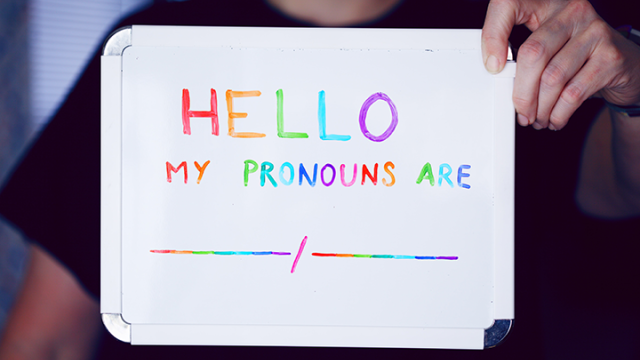Designing a 2SLGBTQIA+ Inclusive Travel Program: Panelist Q&A + Resource List
To wrap up Pride Month 2022, FCM hosted a webinar featuring corporate travel experts who covered a lot of very important and relevant topics for 2SLGBTQIA+ business travellers: safety tips for both travellers and organizations, helpful resources to “know before you go,” and expert commentary on the challenges facing 2SLGBTQIA+ business travellers today.
We received more questions than we could answer live, so we wanted to make sure to follow up after the webinar. In this blog, you’ll find our panelists’ answers to the questions we didn’t have time to address live, and a list of the helpful 2SLGBTQIA+ resources we discussed.
Q: Where can you find the list of countries that are unsafe for our outlaw 2SLGBTQIA+ people?
A: Your first resource is the "Travel and your sexual orientation, gender identity, gender expression and sex characteristics" on the Canadian government website or the LGBTQI+ page on the American government website. Additionally, the International LGBTQ+ Travel Association (IGLTA) has created insightful online guides for LGBTQ+ safety, trans safety, marriage equality, and HIV travel.
Q: How should we approach 2SLGBTQIA+ people who use hybrid pronouns such as she/they?
A: Just ask! Some people might use one set of pronouns in certain contexts, but not others. Some people might be more comfortable with alternating between pronouns. Others might wear pins or bracelets to indicate which set of pronouns they currently use. As with everyone, it's best not to assume. Rather, simply offer your own pronouns and ask how you can respectfully refer to the person.
In the context of booking travel, try not to limit travellers to selecting only one set of pronouns when building their profile. Keep in mind that it may be best practice for people to stick to one set of pronouns on their bookings and travel documents for a smooth experience.
Q: Would the panelists please provide all their essential resources for organizations who want to be more inclusive of their 2SLGBTQIA+ travellers?
A: Of course! Check out below for a list of our favorites:
-
Equaldex is a crowd-sourced knowledge base of LGBTQ+ rights by country and region
-
International Lesbian, Gay, Bisexual, Trans, and Intersex Association (ILGA) publishes an annual world report and a map on legislation that criminalizes or protects people on the basis of their sexual orientation or recognizing their relationships.
-
The Global Divide on Homosexuality highlights countries' cultural attitudes toward homosexuality.
-
OutRight Action International also provides reports of human rights violations specific to LGBTQ+ communities
-
Amnesty International publishes a report on the state of the world's human rights.
-
The U.S. State Department also publishes annual human rights reports, which include acts of violence and discrimination based on gender identity and sexual orientation.
-
ManAboutWorld, a digital magazine for LGBTQ travellers, has an LGBTQ Guide for Travel Safety, which provides advice for transgender travellers.
-
For U.S. nationals, the U.S. State Department Bureau of Consular Affairs provides information on passport gender designation changes and name changes.
-
Both of the following resources are specific to the U.S. and may not apply abroad, where procedures may vary and/or be inconsistent; however, they prepare you for departure from a U.S. airport. The Transportation Security Administration (TSA) provides guidance for transgender passengers. And the National Center for Transgender Equality provides information on airport security and TSA procedures.
For guidance on how to support 2SLGBTQIA+ employees, check out these pieces from Risk Management Magazine and the Risk Management Monitor:
Here are more guides for building a good travel risk management program:
The following resources are excellent for promoting workplace diversity and inclusion, along with encouraging further learning:
-
The Canadian Centre for Diversity and Inclusion - Canadian Centre for Diversity and Inclusion is a forward-looking social organization with research and learning woven into their DNA, tracing how people identify alongside demographic trends within the Canadian workplace to move employers from diversity to inclusion.
-
Pride at Work - Through dialogue, education and thought leadership, Pride at Work Canada/Fierté au travail Canada empowers Canadian employers to build workplaces that celebrate all employees regardless of gender expression, gender identity, and sexual orientation. Their learning, networking and community events happen across the country, advising, celebrating and connecting the most inclusive Canadian employers.
-
Out & Equal - Out & Equal is the premier organization working exclusively on LGBTQ+ workplace equality. Through their worldwide programs, Fortune 500 partnerships and their annual Workplace Summit conference, they help LGBTQ+ people thrive and support organizations creating a culture of belonging for all.
-
All-In with Google - LGBTQ+ people have been historically excluded from marketing creative, most notably in the media's portrayal of LGBTQ+ women, people of color (especially women of color), trans and gender expansive people, people with disabilities, and older people. Built with input from community partners, these U.S.-focused insights are a starting reference to help you create marketing that positively and authentically represents LGBTQ+ people – both inside and outside of Pride Month campaigns.
-
Pronouns.org - Pronouns.org is a practical resource dedicated to the empowering and inclusive use of personal pronouns in the English language. This website will help you understand why and how to use the pronouns someone goes by.
-
PFLAG - Founded in 1973, PFLAG is the first and largest organization dedicated to supporting, educating, and advocating for LGBTQ+ people and their families. PFLAG’s network of hundreds of chapters and more than 325,000 members and supporters works to create a caring, just, and affirming world for LGBTQ+ people and those who love them.
-
IGLTA - IGLTA was founded in 1983 and is the world's leading network of LGBTQ+ welcoming tourism businesses. They provide free travel resources and information while continuously working to promote equality and safety within LGBTQ+ tourism worldwide. IGLTA's members include LGBTQ+ friendly accommodations, transport, destinations, service providers, travel agents, tour operators, events and travel media located in over 80 countries.



